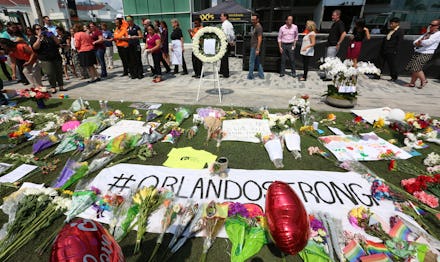Opinion: With Our Gun Laws, Mass Shootings Aren’t "Unimaginable" — They're Inevitable

On Sunday, our nation woke to the news that the deadliest mass shooting in U.S. history had taken place while most of us were still asleep. 29-year-old Omar Mateen opened fire on patrons of Pulse, a gay nightclub in Orlando, Florida, taking 49 innocent lives and seriously wounding 53 more.
Hours after the tragedy, Orlando Mayor Buddy Dyer declared a state of emergency in the city, telling the press, "We're dealing with something that we never imagined and is unimaginable. There's blood everywhere."
With those words, Dyer managed to capture the severity of the moment, a horrific scene for which nearly every harrowing descriptor associated with tragedy is justified.
But there's one word we can no longer use to describe tragedies like the massacre at Pulse: unimaginable.
There is nothing unimaginable about this tragedy when there are more guns than people in the United States, and Americans are 25 times more likely to be murdered with a gun than people in other developed countries.
There is nothing unimaginable about this tragedy when the United States has 5% of the world's population and 31% of the world's mass shootings — including 139 mass shootings to date in 2016 alone (nearly one per day this year).
There is nothing unimaginable about this tragedy when there have been 6,037 deaths from gun violence in 2016 alone, more than double the number people killed in the Sept. 11 terrorist attacks.
There is nothing unimaginable about this tragedy when President Obama has been forced to stand in front of the nation 14 other times after a mass shooting, yet Congress has passed exactly 0 new gun control laws since the Sandy Hook Elementary School shooting in Newtown, Connecticut.
There is nothing unimaginable about this tragedy when it is easier to buy a semi-automatic AR-15 assault-style rifle in Florida — the same gun used in the San Bernardino, California and Sandy Hook mass shootings — than a pistol.
There is nothing unimaginable about this tragedy when it is still legal to discriminate against LGBTQ people in 33 states — 28 states with no protection and 5 states with incomplete protection — and people in various LGBTQ communities are still banned from giving blood by the Food and Drug Administration.
There is nothing unimaginable about this tragedy when one in five hate crimes is based on sexual orientation, and, though the bill ultimately passed, 146 members of the House voted against legislation that extended hate crime protection to LGBTQ people.
There is nothing unimaginable about this tragedy when more than half of transgender youth attempt suicide, and 30% of all teen suicides each year are committed by LGBTQ people.
There is nothing unimaginable about this tragedy when LGBTQ students will hear on average 26 anti-LGBT slurs per day at school and 18.3% report being assaulted because of their sexual orientation.
There is nothing unimaginable about this tragedy when Islamophobic rhetoric and hate crimes against Muslims are on the rise in the U.S., which the Islamic State terrorist group uses in turn to recruit new fighters.
There is nothing unimaginable about this tragedy when ISIS propaganda encourages lone wolf actors to commit mass murder, and the ease of buying a weapon in the United States allows them to do so.
None of these factors, alone, explain why a man who pledged his allegiance to ISIS used an AR-15 assault-style weapon to gun down 49 innocent people at a gay club. But they do underscore the extent to which Sunday's mass shooting was the result of a series of interconnected factors — the prevalence of guns and the regularity of anti-LGBTQ violence — all of which could indeed be addressed by lawmakers.
Simply put, the time for Congress' thoughts and prayers has long passed; we need concerted action. Future attacks like Sunday's mass shooting will continue to be the norm unless we agitate, organize and hold our elected officials accountable.
Erica Lafferty Smegielski, daughter of slain Sandy Hook principal Dawn Hochsprung who now works for Everytown for Gun Safety, recently told me that despite the circumstances, she remains hopeful for the future, because gun control is now at the forefront of our political debate. Indeed, hard as it is to believe, we are beginning to see change at the state level. Six states have passed background checks since Sandy Hook. Meanwhile, 19 states have laws on the books to prevent perpetrators of domestic violence from getting their hands on guns, and 23 states prevent subjects of restraining orders from buying guns.
None of these changes have happened by accident. If Sunday was the day to mourn, now is the time to get angry and demand change. Tragedies like the one that transpired at Pulse are not inevitable unless we make them so.